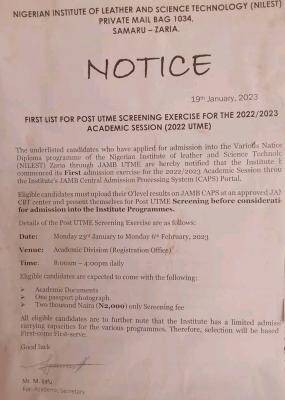
Gaining admission into Nigerian universities can be very challenging, especially when you are trying to gain admission through Joint Admissions and Matriculation Board (JAMB). Luckingly, there are currently alternative ways through which you can gain this admission without sitting for JAMB. In this article, we will be taking a look at How to gain University Admission without JAMB in Nigeria.
How to University Gain Admission Without JAMB
It is important to note that JAMB is not the only route to gain admission into universities in Nigeria. Other routes through which you can gain admission without JAMB includes:
- Gain admission without JAMB through Interim Joint Admission Matriculation Board (IJMB) examination.
- Gain admission without JAMB through Joint Universities Preliminary Examination Board (JUPEB) Programme.
- Gain admission without JAMB through Diploma Programme (ND/HND).
- Gain admission without JAMB through Pre-Degree Programmes / Remedial Programs.
- Gain admission without JAMB through Part-Time Programmes / Weekend Programs.
- Gain admission without JAMB through Direct Entry.
- Gain admission without JAMB by studying in National Open University of Nigeria (NOUN).
- Gain admission without JAMB by studying in Private Universities.
- Gain admission without JAMB by studying Abroad.
1. How to gain admission without JAMB through IJMB
Established in 1976, the Interim Joint Admission Matriculation Board (IJMB) program is a federal government-approved program that provides a unique pathway for candidates seeking admission into Nigerian universities. IJMB is designed to offer an alternative to JAMB and is widely recognized by various universities across the country. The program spans through a duration of nine months; which is divided into two semesters. During this perios, students undergo rigorous academic training in subjects relevant to their chosen field of study. The curriculum is structured to align with university standards, ensuring that students are well-prepared for the challenges of higher education.
At the end of the nine-month program, candidates are required to sit for the IJMB examination, which covers the subjects they studied during the course. The examination is conducted by the IJMB governing body, and successful candidates are awarded certificates based on their performance.
Advantages of IJMB:
- Direct Admission into 200 Level: One of the most significant advantages of IJMB is that successful candidates are granted direct entry admission into the 200 level of their chosen courses in various Nigerian universities. This skips the hurdles associated with JAMB and allows for a smoother transition into higher education.
- Widely Accepted: IJMB is recognized by a vast number of universities in Nigeria. This recognition makes it a credible and widely accepted alternative to JAMB for gaining direct entry into universities.
- Cost-Effective: Compared to other pre-degree programs, IJMB is relatively cost-effective. This affordability makes it accessible to a broader range of students, including those who may face financial constraints.
- Flexibility: The IJMB program is flexible, allowing candidates to choose from a variety of subject combinations based on their intended field of study. This flexibility is beneficial for students who already have a clear idea of their academic and career goals.
- No Age Limit: Unlike JAMB, IJMB does not have age restrictions. This means that individuals of any age can enroll in the program, making it suitable for those who may have delayed their pursuit of higher education.
How To Apply For IJMB:
There are some education centers that undertake the IJMB program, you can search for any of such center in your location and apply through them.
At the time of compiling this report, we at SchoolGist do not have contact to a verified center/agent that undertakes the IJMB program. If you have such information, kindly notify us, so that we can include the information here.
2. How to gain admission without JAMB through JUPEB
The Joint Universities Preliminary Examination Board (JUPEB) is a national examination body established by the Nigerian universities in collaboration with the Interim Joint Matriculation Board (IJMB). Launched to create an alternative entry mode for candidates seeking admission into Nigerian universities, JUPEB has gained recognition as a reliable and effective pathway to higher education.
The JUPEB program typically spans a duration of one academic session, usually nine to ten months. During this period, students undergo intensive academic training in subjects relevant to their chosen fields of study. The curriculum is designed to meet university standards, ensuring that students are adequately prepared for the challenges of undergraduate studies.
At the end of a JUPEB program, candidates are required to sit for the JUPEB examination, which covers the subjects they studied during the course. The examination is comprehensive and evaluates the students' understanding and proficiency in their chosen subjects. Successful candidates are then awarded JUPEB certificates, which are recognized by affiliated universities.
Advantages of JUPEB:
- Direct Admission into 200 Level: One of the primary advantages of JUPEB is that successful candidates are granted direct entry admission into the 200 level of their chosen courses in Nigerian universities. This eliminates the need for the traditional JAMB process and facilitates a seamless transition into higher education.
- Wide Acceptance: JUPEB is widely accepted by universities across Nigeria. Its recognition by numerous institutions makes it a credible alternative for students seeking to bypass the challenges associated with JAMB and secure direct entry admission.
- Comprehensive Curriculum: The JUPEB curriculum is carefully crafted to align with university standards. This ensures that students not only meet the entry requirements but are also well-prepared for the academic demands of their chosen fields of study.
- Versatility in Subject Combinations: JUPEB allows students to choose subject combinations based on their intended courses of study. This flexibility accommodates a diverse range of academic interests and career aspirations.
- No Age Limit: Similar to IJMB, JUPEB does not impose age restrictions on candidates. This inclusivity enables individuals of various ages to pursue higher education without concerns about age limitations.
How To Apply For JUPEB
Unlike IJMB, JUPEB is handled by Universities only. Therefore, interested candidates advised to visit any University that is approved by JUPEB in order to enroll for the program. As at the time of compiling this report, there are 84 Approved JUPEB Affiliated Universities (Click Here to see the list of Affiliated Universities) and 10 Partner Universities (Click Here to see the list of Partner Universities). The average cost for the JUPEB enrollment form (as at 2023) is N10,000 (Ten Thousand Naira), but this can differ based on the institution and the time of your application.
For more information, you can visit the JUPEB website at https://jupeb.edu.ng
3. How to gain admission without JAMB through Diploma Program
Diploma programmes, such as the National Diploma (ND) and Higher National Diploma (HND), are specialized courses offered by Polytechnics and certain institutions across Nigeria. These programmes are designed to provide students with practical skills and knowledge in specific fields, preparing them for the workforce while also offering a pathway to higher education.
The National Diploma (ND) programme typically spans a duration of two years and is the first level of the diploma hierarchy. Students undergo a comprehensive curriculum that combines theoretical knowledge with practical skills relevant to their chosen field.
Building upon the ND, the Higher National Diploma (HND) programme extends for an additional two years. It delves deeper into the chosen field, offering more specialized and advanced coursework. HND programmes often include industrial training or practical experience, enhancing students' readiness for the workforce.
Advantages of Diploma Programmes:
- Practical Skill Development: Diploma programmes prioritize the development of practical skills, ensuring that graduates are not only academically proficient but also equipped with the hands-on experience necessary for their chosen professions.
- Workforce Readiness: ND and HND graduates are well-prepared for the workforce. The emphasis on practical training in these programmes enhances students' employability, making them valuable assets to employers in various industries.
- Direct Entry into University: One notable advantage of diploma programmes is that successful graduates can secure direct entry admission into universities in Nigeria. This eliminates the need for the traditional JAMB route and provides a smoother transition into higher education.
- Field-Specific Specialization: Diploma programmes allow students to specialize in specific fields early on in their academic journey. This focused approach enables them to tailor their education to align with their career goals.
- Flexibility in Entry Requirements: Diploma programmes often have more flexible entry requirements compared to direct entry through JUPEB or IJMB. This inclusivity accommodates a diverse range of students, including those who may not have excelled in their secondary school examinations.
How To Apply For Diploma Programme
Just as JUPEB is handled by Universities, Diploma Programmes are handled by Polytechnics and certain institutions. Hence, interested candidates advised to visit any Polytechnic of their choice and following the Admission procedure in order to get admitted into the institution.
4. How to gain admission without JAMB through Pre-Degree Programme
Pre-Degree Programmes are educational initiatives designed to bridge the gap between secondary education and university studies. These programs aim to prepare students academically for the challenges of higher education, often incorporating foundational courses and comprehensive curricula.
Pre-Degree Programmes typically last for one academic session, usually spanning nine to twelve months. During this period, students engage in intensive academic training to enhance their understanding of core subjects relevant to their chosen fields of study.
The curriculum of Pre-Degree Programmes covers a range of subjects, including mathematics, English, and specific subjects related to the students' intended courses. The goal is to provide a solid academic foundation and ensure that students are well-prepared for university-level studies.
Advantages of Pre-Degree Programmes:
- Academic Preparedness: One of the primary benefits of Pre-Degree Programmes is that they prepare students for the academic rigors of university life. The foundational courses and comprehensive curricula help bridge any gaps in knowledge, ensuring that students enter university with a strong academic foundation.
- Increased Confidence: Engaging in a Pre-Degree Programme can boost students' confidence in their academic abilities. The exposure to university-level coursework and the successful completion of the program instill a sense of accomplishment, empowering students to tackle the challenges of higher education with confidence.
- Smooth Transition to University: Pre-Degree Programmes facilitate a smooth transition from secondary education to university studies. Students who successfully complete the program often enjoy streamlined admission processes into affiliated universities, eliminating some of the hurdles associated with traditional entry requirements.
- Personal Development: Beyond academics, Pre-Degree Programmes contribute to students' personal development. The immersive nature of these programs encourages self-discipline, time management, and critical thinking skills, which are crucial for success in higher education and beyond.
- Access to Support Services: Pre-Degree students typically have access to support services such as counseling, mentoring, and tutorial assistance. This additional support contributes to the overall success and well-being of students during the transitional phase.
How To Apply For Pre-Degree Programme
Similar to JUPEB, Pre-Degree Programme is handled by Universities. Hence, interested candidates advised to visit their desired university and following the Admission procedure as laid-out by the institution in order to get admitted.
5. How to gain admission without JAMB through Part-Time Programmes (Weekend Programme)
Part-Time Programmes, also called Weekend Programmes, are educational initiatives designed to cater to the schedules of working professionals, parents, or individuals with various commitments that make full-time study challenging. These programmes allow students to pursue higher education on a part-time basis, attending classes during weekends while maintaining their weekday responsibilities. Part-Time Programmes are tailored to accommodate the busy schedules of working adults. Classes are typically conducted during weekends, providing the flexibility needed for individuals to balance their educational pursuits with other responsibilities.
Unlike traditional full-time programmes, part-time courses often have an extended duration of about 1-2 years. This allows students to cover the same material but at a more manageable pace, considering the limited time commitment available on weekends. Part-Time Programmes cover a wide range of disciplines, enabling individuals to choose courses that align with their career goals. From business and technology to arts and sciences, these programmes offer diverse options to cater to different interests and aspirations.
Advantages of Part-Time Programmes (Weekend Programmes):
- Professional Development: Part-Time Programmes provide an avenue for working professionals to enhance their skills and qualifications without disrupting their careers. This allows individuals to remain competitive in their fields and opens up opportunities for career advancement.
- Work-Life-Education Balance: One of the significant advantages of part-time studies is the ability to maintain a balance between work, personal life, and education. This flexibility is especially crucial for individuals who may have family obligations or demanding work schedules.
- Financial Flexibility: Part-Time Programmes often allow students to pay for their education in installments, reducing the financial burden associated with full-time studies. This financial flexibility makes higher education more accessible to a broader range of individuals.
- Networking Opportunities: Part-Time Programmes attract individuals from diverse professional backgrounds. This diversity fosters networking opportunities and allows students to build connections with peers who bring varied perspectives and experiences to the learning environment.
- Accessible to Non-Traditional Students: Part-Time Programmes are particularly beneficial for non-traditional students, including parents, older adults, and those re-entering education after a hiatus. These programmes cater to the diverse needs of individuals at different stages of life.
How To Apply For Part-Time Programmes
Similar to Pre-Degree Programme, Part-Time Programmes are handled by Universities. Hence, interested candidates advised to visit their desired university and following the Admission procedure as laid-out by the institution in order to get admitted.
6. How to gain admission without JAMB through Direct Entry
Direct Entry is a pathway that allows candidates to bypass the traditional Joint Admissions and Matriculation Board (JAMB) route and gain direct admission into the university. The NABTEB A-Level Certificate, administered by the National Business and Technical Examinations Board (NABTEB), serves as a credible qualification for Direct Entry into universities in Nigeria.
A-Level stands for Advanced Level, the primary purpose of this exam is to cater for student who wish to gain admission into the University of their choice but have not been able to do so through JAMB. NABTEB A-Level offers a range of subject combinations, allowing students to choose courses aligned with their intended field of study. The flexibility in subject offerings caters to diverse academic interests and career aspirations NABTEB A-Level places a significant emphasis on practical skills and technical knowledge. This practical focus ensures that students are not only academically proficient but also well-equipped for the demands of their chosen professions.
Advantages of Direct Entry through NABTEB A-Level:
- Streamlined Admission Process: Direct Entry using NABTEB A-Level provides a more direct and streamlined admission process into universities. Successful candidates can enter directly into the 200 level of their chosen courses, saving time and effort compared to the traditional JAMB route.
- Recognition by Universities: NABTEB A-Level is widely recognized by universities across Nigeria. Its acceptance as a Direct Entry qualification underscores its credibility and value in the academic landscape.
- Focus on Technical and Vocational Skills: For students interested in technical and vocational fields, NABTEB A-Level offers a tailored curriculum that aligns with the demands of these professions. This practical orientation enhances graduates' employability in various industries.
- Affordability: The NABTEB A-Level programme is often more affordable compared to some other pre-degree or preparatory programmes, making it accessible to a broader range of students, including those with financial constraints.
- Diversity of Candidates: Direct Entry through NABTEB A-Level attracts a diverse pool of candidates, including those with technical and vocational backgrounds. This diversity contributes to a rich learning environment and exposes students to varied perspectives.
How To Apply For NABTEB A-Level Programme
NABTEB A-Level programme has approve study centres, when you attend lectures in any of the approved Nabteb A’ Level Study center and pass, you will be able to combine the result with the Direct Entry form and use it to gain admission into 200 level.
For more information about NABTEB, visit the official website at https://nabteb.gov.ng
7. How to gain admission without JAMB by studying in National Open University of Nigeria (NOUN).
Established in 1983 but officially recognized as a university in 2002, NOUN operates on an open and distance learning (ODL) platform. This innovative approach to education allows students to engage in learning without the constraints of traditional classroom settings, catering to the needs of working professionals, parents, and individuals with various commitments. NOUN adopts a flexible learning model, allowing students to study at their own pace and convenience. This flexibility is particularly beneficial for individuals with work responsibilities, family obligations, or other commitments that may pose challenges to traditional, on-campus learning.
The institution operates an open admission policy, providing equal opportunities for all qualified individuals, regardless of age, background, or prior academic history. This inclusivity aligns with the university's commitment to expanding access to education. It's distance learning model leverages technology to deliver course content to students wherever they are located. Through the use of online resources, study materials, and virtual interactions, students can engage with their coursework without the need to attend physical classes.
Studying at NOUN is relatively more affordable compared to traditional universities (especially the private universities), making higher education accessible to a broader demographic. The university's commitment to providing quality education at an affordable cost contributes to its popularity among diverse student populations. It also offers a wide range of undergraduate and postgraduate programs across various disciplines. From business and technology to arts and social sciences, the university caters to diverse academic interests, ensuring that students can pursue courses aligned with their career goals.
Advantages of Studying at the National Open University of Nigeria (NOUN):
- Accessibility: NOUN's open and distance learning approach makes education accessible to individuals who may face geographical, time, or financial constraints. Students can engage in learning from the comfort of their homes or workplaces.
- Work-Study Balance: NOUN's flexible model allows students to balance work and study effectively. Working professionals, parents, and those with other commitments can pursue higher education without compromising their existing responsibilities.
- Self-Paced Learning: NOUN's self-paced learning model empowers students to take control of their education. They can progress through their coursework at a pace that suits their individual learning styles and preferences.
- Innovative Learning Resources: NOUN leverages technology to provide innovative learning resources, including online lectures, e-books, and interactive platforms. This ensures that students have access to contemporary and dynamic educational materials.
- Nationally Recognized Degrees: Degrees obtained from NOUN are nationally recognized, ensuring that graduates have the same standing as those from traditional universities. This recognition adds credibility to the qualifications earned through the university's programs.
How To Apply For Admission into National Open University of Nigeria (NOUN)
An applicant for undergraduate admission into NOUN is often required to have obtained a minimum of 5 O-level credits including English Language and Mathematics. Additional requirements may apply for some programmes and these can be viewed during the application process - after selecting the Programme and entry level at the Faculty’s admission page. To apply for admission into National Open University of Nigeria (NOUN), follow the underlisted steps:
- Visit the NOUN Official Website, select the Faculty, choose the programme and entry level so that the View Requirement button is enabled. Clicking this button will reveal the corresponding entry requirement and enable the Apply button on the pre-payment application page.
- Fill in all the remaining details on the page before submitting. On successful submission of the pre-payment form, you are redirected to Remita to obtain an RRR invoice which should be used to effect payment for the application form.
- An applicant who pays online using a payment card will automatically obtain the online form which must be filled before submission. Applicants who pay through a bank branch must click on Continue after payment… and enter their Unique ID and RRR. They are also given the opportunity to change the Programme applied for.
- Applicants who had paid using an RRR generated last semester or earlier must restart the application process upto the point when they are re-directed to remita. They should now use the newly generated UniqueID with the old RRR used for payment when they click Proceed after payment.
- In all cases a successful payment will lead to the generation of an online application form which should be filled before submission online. The admission process is automated and the outcome is virtually instantaneous!
8. How to gain admission without JAMB by studying in Private Universities.
The establishment of private universities in Nigeria gained momentum in the late 1990s, presenting an alternative to the traditional public university system. These institutions, often founded by individuals, organizations, or religious bodies, contribute significantly to the expansion and diversification of higher education options in the country. Private universities operate with a level of autonomy that allows them to innovate in terms of curriculum, teaching methods, and infrastructure. This flexibility fosters an environment where cutting-edge ideas can thrive, creating a dynamic educational experience for students.
Many private universities in Nigeria prioritize quality education, investing in well-qualified faculty, modern facilities, and up-to-date technology. This commitment to excellence contributes to a high standard of education that prepares students for the challenges of the modern workforce. Private universities offer a wide range of programs across various disciplines, including business, humanities, sciences, and technology. This diversity allows students to pursue courses aligned with their passions and career aspirations.
Unlike government-owned universities, most private universities do not require an applicant to obtain JAMB in order to be admitted into the university. Also, they often boast of smaller class sizes, enabling more personalized attention for students. This intimate learning environment fosters closer relationships between students and faculty, facilitating a more interactive and engaging educational experience.
Advantages of studying in Private Universities:
- Modern Infrastructure: Private universities invest in state-of-the-art facilities, including well-equipped classrooms, laboratories, libraries, and recreational spaces. This modern infrastructure enhances the overall learning environment, providing students with resources that support academic and extracurricular activities.
- Entrepreneurial and Career-Oriented Programs: Many private universities in Nigeria offer programs that emphasize entrepreneurship, practical skills, and industry relevance. This focus aligns with the demands of the contemporary job market, preparing students for successful careers upon graduation.
- Flexibility in Admission: Private universities often have more flexible admission criteria, allowing students with diverse academic backgrounds to gain entry. This inclusivity accommodates a broader range of individuals, fostering diversity within the student body.
- Corporate Partnerships: Private universities frequently establish partnerships with industries and businesses. These collaborations provide students with opportunities for internships, real-world experience, and networking, enhancing their employability upon graduation.
- Religious and Value-Based Education: Some private universities are founded on religious or value-based principles, offering students an education that integrates moral and ethical values. This distinctive approach appeals to individuals seeking a holistic educational experience.
How To Apply For Admission into any Private University
The application process varies based on the university in question. Therefore, we advice applicants to visit the university or its official website for admission procedure.
List of Private Universities in Nigeria
There are quite a huge number of Nigerian private universities that can offer you admission without JAMB; however, here are a few of them:
- Achievers University, Owo
- Adeleke University, Ede
- Afe Babalola University, Ado Ekiti,Ekiti State
- African University of Science & Technology, Abuja
- Ajayi Crowther University, Ibadan
- Al Hikmah University, Ilorin
- American University Of Nigerian, Yola
- Babcock University, Ilishn Remo
- Baze University
- Bells University Of Technolgy, Otta
- Benson Idahosa University, Benin City
- Bingham University, New Karu
- Bowen University, Iwo
- Caleb University, Lagos
- Caritas University, Enugu
- CETEP City University, Lagos
- Covenant University, Ota
- Crawford University Igbesa
- Crescent University
- Elizade University, Ilara Mokin
- Evangel University, Akaeze Mountain University, Osogbo
- Godfrey Okoye University, Ugwuomu Nike, Enugu State
- Gregory University, Uturu
- Igbinedion University Okada
- Joseph Ayo Babalola University, Ikeji Arakeji
- Kastina University, Kastina
- Landmark University, Omu Aran
- Lead City University, Ibadan
- Madonna University
- Macpherson University, Seriki Sotaya, Ajebo
- Nigerian Turkish Nile University, Abuja
- Novena University, Ogume
- Obong University, Ipetumodu, Osun State
- Pan African University, Lagos
- Paul University Awka Anambra State
- Redeemers University, Mowe
- Renaissance University, Enugu
- Rhema University, Obeama Asa Rivers State
- Salem University, Lokoja
- Samuel Adegboyega University, Ogwa
- Southwestern University, Oku Owa
- Tansian University, Umuya
- University Of Mkar, Mkar
- Veritas University
- Wellspring University, Evbuobanosa Edo State
- Wesley Univ. Of Science & Tech., Ondo
- Western Delta University, Oghara
- Wukari Jubilee University, Wukari
9. How to gain admission without JAMB by studying Abroad
Studying abroad is a pursuit that goes beyond geographical boundaries, offering students the opportunity to immerse themselves in diverse cultures, academic environments, and global perspectives. The decision to study in a foreign country is often driven by a desire for a well-rounded education, exposure to different teaching methods, and the chance to explore new horizons both academically and personally.
While the benefits of studying abroad are numerous, it's important to acknowledge the challenges that may arise. These challenges can include cultural adjustment, homesickness, and the need to adapt to different educational systems. However, many universities and international student support services are equipped to help students overcome these challenges, providing guidance, counseling, and resources to ensure a positive academic and personal experience.
Many renowned universities and institutions are located around the world, each offering unique academic programs. These foreign universities do not require you to obtain JAMB in order to gain admission into the institution. However, each of these universities have its own requirements, including academic records, English proficiency proof, and standardized test scores.
Conclusion
In conclusion, the landscape of higher education in Nigeria is evolving, offering diverse and innovative pathways for individuals to gain admission without solely relying on the traditional Joint Admissions and Matriculation Board (JAMB) process. The exploration of alternative routes, such as the Interim Joint Admission Matriculation Board (IJMB), Joint Universities Preliminary Examination Board (JUPEB) Programme, Diploma Programmes, Pre-Degree Programmes, Part-Time Weekend Programmes, Direct Entry through NABTEB A-Level, studying at the National Open University of Nigeria (NOUN), and enrolling in Private Universities or pursuing education abroad, highlights the adaptability of the educational system to cater to the diverse needs and aspirations of students.
Each approach offers its own set of advantages, from flexibility and cost-effectiveness to specialized training and global exposure. Whether it's the practical focus of vocational programmes, the inclusivity of distance learning, the autonomy of private universities, or the transformative experience of studying abroad, these alternatives showcase the dynamic and expanding landscape of higher education options in Nigeria.
Aspiring students now have the opportunity to choose a path that aligns with their individual circumstances, preferences, and career goals. The emphasis on accessibility, practical skill development, and global perspectives reflects a commitment to providing a well-rounded education that prepares students not only for academic success but also for the challenges and opportunities of a rapidly changing world.
In navigating the myriad options available, individuals can make informed choices that suit their unique circumstances, ensuring that the pursuit of higher education is both enriching and tailored to their aspirations. As the educational landscape continues to evolve, the emphasis on flexibility, inclusivity, and quality education positions Nigeria's higher education system to meet the diverse needs of its aspiring students, fostering a generation of individuals poised for success in a globalized and dynamic future.
Above all, as you take your decisions and embark on your academic pursuit, we at SchoolGist.Ng wish you the best of lucks.




